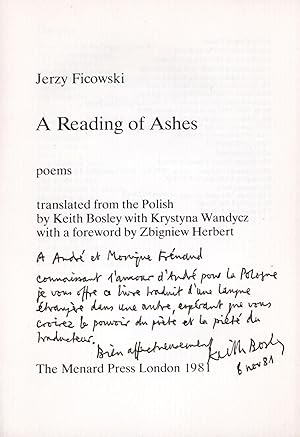reading ashes de ficowski jerzy (2 resultados)
Tipo de artículo
- Todo tipo de artículos
- Libros (2)
- Revistas y publicaciones
- Cómics
- Partituras
- Arte, grabados y pósters
- Fotografías
- Mapas
-
Manuscritos y
coleccionismo de papel
Condición
- Todo
- Nuevos
- Antiguos o usados
Encuadernación
- Todo
- Tapa dura
- Tapa blanda
Más atributos
- Primera edición
- Firmado
- Sobrecubierta (1)
- Con imágenes del vendedor
- Sin impresión bajo demanda
Ubicación del vendedor
Valoración de los vendedores
-
A reading of ashes. Translated from the polish by Keith Bosley with Krystyna Wandycz. Foreword by Zbingiew Herbert.
Publicado por The Menard Press, 1981
Librería: Librairie Jean-Yves Lacroix, Gouloux, Francia
Miembro de asociación: ILAB
Libro
Couverture souple. Condición: Très bon. Londres, The Menard Press, 1981. In-8 broché, 32 pages. Édition originale sur vergé de cette traduction anglaise due à Keith Bosley. Long et bel envoi autographe signé de ce dernier au poète André Frénaud et à sa femme, Monique Mathieu. Keith Bosley fut également le traducteur anglais d'André Frénaud.
-
ODCZYTANIE POPIOLOW Kriat efer-mikle [= a reading of ashes]
Publicado por Gazit, Tel Aviv, Israel, 1986
Librería: Meir Turner, New York, NY, Estados Unidos de America
Libro
Soft cover. Condición: Very Good. Estado de la sobrecubierta: Very Good. Chagall, Marc (1887-1985) Ilustrador. Limited Edition. Hebrew translation pages face the Polish pages. The Hebrew is vowelized. Bibliophilic edition of 625 numbered copies. Jerzy Ficowski (October 4, 1924, Warsaw - May 9, 2006, Warsaw) was a Polish poet, writer and translator (from Yiddish, Russian, Romani and Hungarian). During the German occupation of Poland in World War II, Ficowski who lived in W¿ochy near Warsaw was a member of the Polish resistance. He was a member of the Home Army (Armia Krajowa, AK), was imprisoned in the infamous Pawiak and took part in the Warsaw Uprising of 1944. His codename was Wrak and he fought in Mokotów region. Following the Warsaw Uprising, Ficowski entered a camp with other survivors of the battle. After the war, Ficowski returned to Warsaw and enrolled at the university in order to study philosophy and sociology. There he published his first volume of poetry, O¿owiani ¿o¿nierze (The Tin Soldiers, 1948). This volume reflected the Stalinist atmosphere of the early postwar Poland, in which heroes of the Armia Krajowa Warsaw Uprising were treated with suspicion at best, arrested and executed at worst, together with the sense of a new city arising from the ashes of the old. His early works show the influence of Julian Tuwim. Later he became interested in the poems of the interwar period, with elements of fantasy and grotesque. In the later period his poems reflected various moral and social aspects of life in the People's Republic of Poland. From 1948 to 1950 Ficowski chose to travel with Polish Gypsies and came to write several volumes on or inspired by the Roma way of life, including Amulety i defilacje (Amulets and Definitions, 1960) and Cyganie na polskich drogach (Gypsies on the Polish Roads, 1965). He was the member of the Gypsy Lore Society and translated the poems of Bronis¿awa Wajs (Papusza). He was interested in many aspects of international poetry. He translated the poems of the Spanish poet, Federico García Lorca, and he was also a known specialist of Jewish folklore and Modern Hebrew poetry, becoming an editor of the Jewish poem anthology Rodzynki z migda¿ami (Raisins with Almonds, 1964). Ficowski devoted many years of his life to the study of the life and works of Bruno Schulz, and in 1967 published the first edition of what is considered the definitive biography of him, entitled Regions of the Great Heresy. He received the award of the Polish Pen Club in 1977. His 1979 collection of poems, A Reading of Ashes, has been called the most moving account of the Holocaust written by a non-Jew. As a consequence of his signing, in 1975, of the letter of 59, practically all of Ficowski's writings had become banned in Poland for the remainder of the decade, and only the emergence of Solidarity in the early 1980s has brought his works back to Poland's bookshelves. Both his prose and poems continued to be widely translated in the West. He was active in the opposition movement, and was a member of the Workers' Defence Committee (Komitet Obrony Robotników, KOR) and subsequently of the Committee for Social Self-defence KOR. Under the communist regime he had urged his fellow writers to voice their concerns over censorship and the suppression of workers. His most public statement was a letter to the Writers Union in which he said, "I do not believe deeply in the immediate effectiveness of letters to the government, but even less do I believe in the effectiveness of silence." Following the fall of communism, liberalisation of Poland and its breaking with the Soviet bloc, Ficowski continued to write and translate works from languages as diverse as Spanish and Romanian, not to mention the Yiddish and Roma languages that had always fascinated him.



![Imagen del vendedor de ODCZYTANIE POPIOLOW Kriat efer-mikle [= a reading of ashes] a la venta por Meir Turner](https://pictures.abebooks.com/inventory/md/md19709757646.jpg)